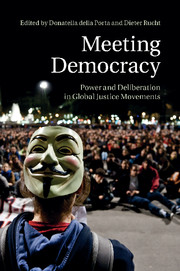Crossref Citations
This Book has been
cited by the following publications. This list is generated based on data provided by Crossref.
della Porta, Donatella
2013.
Rethinking the Public Sphere Through Transnationalizing Processes.
p.
107.
Pearce, Jenny
2013.
Power and the Twenty‐first Century Activist: From the Neighbourhood to the Square.
Development and Change,
Vol. 44,
Issue. 3,
p.
639.
Haug, Christoph
2013.
Organizing Spaces: Meeting Arenas as a Social Movement Infrastructure between Organization, Network, and Institution.
Organization Studies,
Vol. 34,
Issue. 5-6,
p.
705.
De Blasio, Emiliana
2014.
La democrazia digitale nella sfera pubblica globale.
SOCIOLOGIA E POLITICHE SOCIALI,
p.
41.
Tominaga, Kyoko
2014.
Social Movements and Policing in Japan:.
The Annual review of sociology,
Vol. 2014,
Issue. 27,
p.
122.
Smith, Jackie
2014.
Counter-hegemonic networks and the transformation of global climate politics: rethinking movement-state relations.
Global Discourse,
Vol. 4,
Issue. 2-3,
p.
120.
Bonito, Joseph A.
Gastil, John
Ervin, Jennifer N.
and
Meyers, Renee A.
2014.
At the Convergence of Input and Process Models of Group Discussion: A Comparison of Participation Rates across Time, Persons, and Groups.
Communication Monographs,
Vol. 81,
Issue. 2,
p.
179.
Guzman-Concha, Cesar
2015.
Radical Social Movements in Western Europe: A Configurational Analysis.
Social Movement Studies,
Vol. 14,
Issue. 6,
p.
668.
Fabian, Louise
and
Reestorff, Camilla Møhring
2015.
Mediatization and the transformations of cultural activism.
Conjunctions,
Vol. 2,
Issue. 1,
p.
1.
Busse, Britta
Hashem-Wangler, Alexandra
and
Tholen, Jochen
2015.
Two Worlds of Participation: Young People and Politics in Germany.
The Sociological Review,
Vol. 63,
Issue. 2_suppl,
p.
118.
Antentas, Josep Maria
2015.
Spain: theindignadosrebellion of 2011 in perspective.
Labor History,
Vol. 56,
Issue. 2,
p.
136.
Polletta, Francesca
2015.
The Blackwell Encyclopedia of Sociology.
Brunnengräber, Achim
2016.
Nichtstaatliche Akteure in der internationalen Politik.
p.
633.
Abulof, Uriel
2016.
Public political thought: bridging the sociological–philosophical divide in the study of legitimacy.
The British Journal of Sociology,
Vol. 67,
Issue. 2,
p.
371.
Bherer, Laurence
Dufour, Pascale
and
Montambeault, Françoise
2016.
The participatory democracy turn: an introduction.
Journal of Civil Society,
Vol. 12,
Issue. 3,
p.
225.
Klein, Anne
2016.
Inclusive City.
p.
279.
HERMAN, LISE ESTHER
2017.
Democratic Partisanship: From Theoretical Ideal to Empirical Standard.
American Political Science Review,
Vol. 111,
Issue. 4,
p.
738.
Novak, Stéphanie
and
Urfalino, Philippe
2017.
Nouvelles approches de la décision collective : une introduction.
Négociations,
Vol. n° 27,
Issue. 1,
p.
67.
NORMAN, DAVID J.
2017.
Building democratic public spheres? Transnational advocacy networks and the social forum process.
Global Networks,
Vol. 17,
Issue. 2,
p.
300.
2018.
Experimental Practice.
p.
160.





